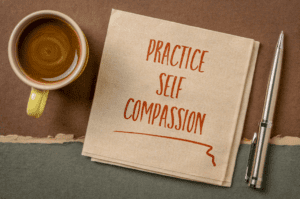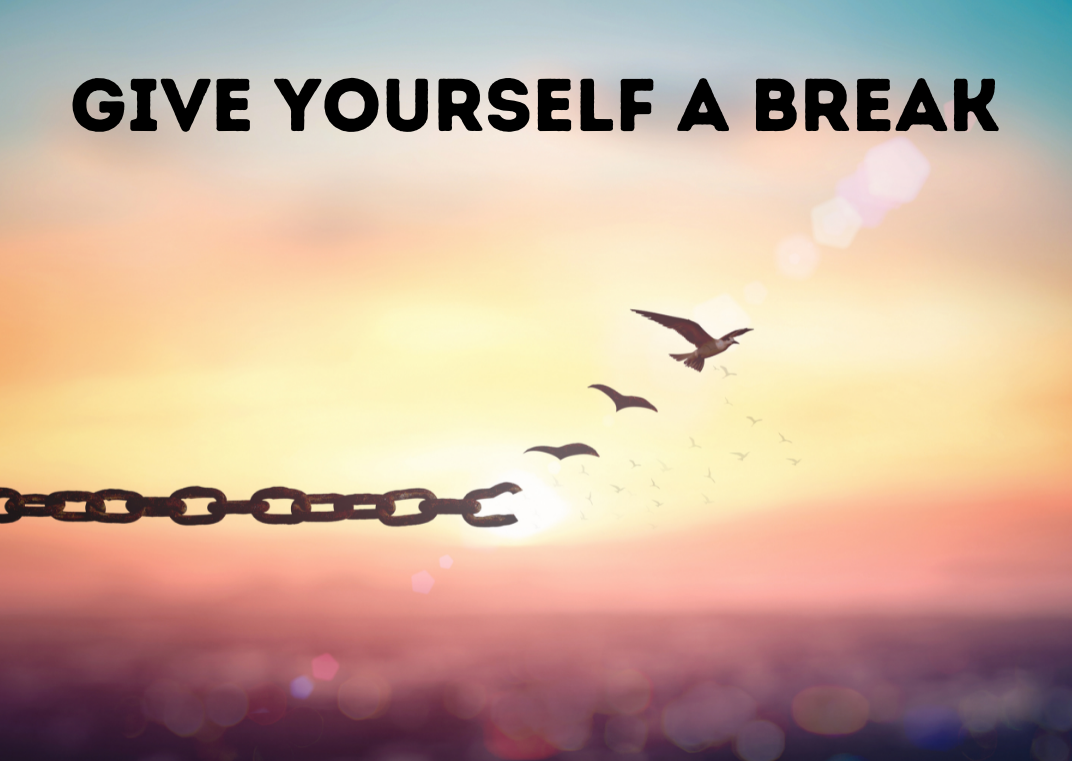We often think of compassion as only a one-way street. A virtue that travels from ourselves toward another. The ability to feel sorrow over another person’s suffering, and to express that sorrow in a way that is intended to alleviate that suffering.
Unlike pity, compassion does not suggest any feeling of superiority to the suffering person but is instead a virtue that forms a bond with the sufferer.
But there is also a school of thought in self-care that says we all need to learn the art of “self-compassion.” Imagine changing the one-way street so that you can balance your self-criticism with a healthy dose of bonding with self.
Self-Compassion is Not Self-Esteem
While an affirming, positive evaluation of oneself has value, the way we have gotten our self-esteem has often (and unfortunately) been achieved by comparing ourselves to others. Since it’s not seen as “good enough” to be average, a flawed logic emerges that demands that now everyone has to be above average. The unintended consequence of this type of self-esteem can lead to a sense of entitlement.
By contrast, self-compassion is not about a positive, negative, or neutral evaluation of oneself. Rather, it is more about evaluating how you relate to yourself. A key to this evaluation is exploring the factors that contribute to us being so self-critical of ourselves in the first place.

Your Own Worst Critic
At its root, self-criticism taps into the fight-or-flight response. This system is hard-wired from our earliest ancestors and worked perfectly back when we well and truly needed it to. Fight-or-flight comes in handy if a saber-tooth tiger is running after us, for example.
This type of threat/defense system was designed to protect us and keep us safe from impending harm. But when the threat is to our very own concept of ourselves, self-criticism is destructive to our self-care and wellbeing.
Think of all the times you have viewed yourself as the problem:
- I can’t believe I put back on all that weight I lost!
- I should have passed that driver’s test on the first try!
- I’m such an idiot for misplacing my keys!
- I know I’m not good enough to deserve a promotion!
When you view yourself as the problem, that ancient reptilian brain kicks in and attacks yourself, and all of the self-critical self-talk begins. It’s a vicious cycle.
Choose Caregiving Over Self-Blame
That same compassion for self can move you from the reptilian brain to the mammalian caregiving system of tending and befriending. Take a cue from nature. You’ve surely seen puppies instinctually attached closely with their mother to stay safe.
The same is true of all mammals. Every one of us is programmed to respond to a warm, soft touch and a soothing voice. Even if it is our own inner-voice. You can yell at yourself or you can soothe yourself in a calming voice. You have the choice.
A wonderful technique in practicing self-compassion for oneself is a physical gesture of affection. That’s right. You can put your own hand on your heart and say caregiving, comforting words to yourself in a supportive, soothing tone. Many studies have shown that the tone of voice we choose in talking to ourselves makes all the difference.

Fire Your Inner Critic
Self-criticism springs up from a desire to keep ourselves safe. For example, have you ever tempered your expectations in a bid to avoid disappointment? In that sense, our inner critic had a job to do. But you can hand it the Pink Slip now as a first step toward having compassion for the critical voice within.
Sure, that self-critical voice often demands to be heard, if only so it can quiet down and hush up. Then you can bring in the self-compassion techniques that soothe and heal the damage criticism may have caused.
You can say to yourself:
- “Yes, I want to keep you safe too, but I want to do it in a more effective way.”
- “Sorry, inner critic, I’m practicing self-compassion today.”
- “I’m talking to myself in a kind, gentle way right now.”
- “I’m going to offer myself the support I need in this moment”
Keep Mindfulness in Mind
The synthesis of all self-compassion is the ability to recognize in the moment when you’re suffering. It may be surprising to discover just how much negative self-talk goes on when you begin to tune-in and become aware.
The good news is that treating yourself to self-compassion isn’t that hard. After all, we provide compassion to our family and friends, co-workers and even strangers. We just have to remember to do it for ourselves, too.
So why do we forget? The answer is that when we criticize ourselves, we reinforce the illusion of control. Self-judgment says that if only we would have tried harder, things would’ve worked out. It’s scary to admit how little control we sometimes have.
It’s like any bad habit we’d like to break. Believing that we need self-criticism to motivate ourselves is a pattern. And it is a big reason for not wanting to be self-compassionate. It’s as if we might become afraid that we’ll be lazy or not do what we need to do without it.
The truth is that when we are in a self-critical place, it is actually the worst possible mindset in which to do our best.
Self-Care Grows When Kindness is Planted
Sprinklers of kindness always say they find love growing all around them. Take this notion to heart and you’ll see that when you start to be kind to yourself, you will radiate positivity within as well.
It is a universal truth that love and kindness go hand in hand. All you require is a compassionate heart and a friendly nature.
It is good to remember that you are not alone. Others struggle the same way as you. When you feel the pangs of self-criticism, be kind to yourself so that you can be happy enough to be kind to the world.
Sooner than you know, you will be surrounded with immense love and brightness – inside and out.
By Mark Smith, contributing author
We invite you to discover inspiring and effective ways to care for yourself and to serve others. Now more than ever, caring is what we all need most. Caring for our self. Caring for others around us. Life now demands caring, resilience and compassion like never before. UCA resources available to help include the Self-Care Center, Virtual Volunteering, radio show, publications and online store offering members huge discounts and always free shipping.

